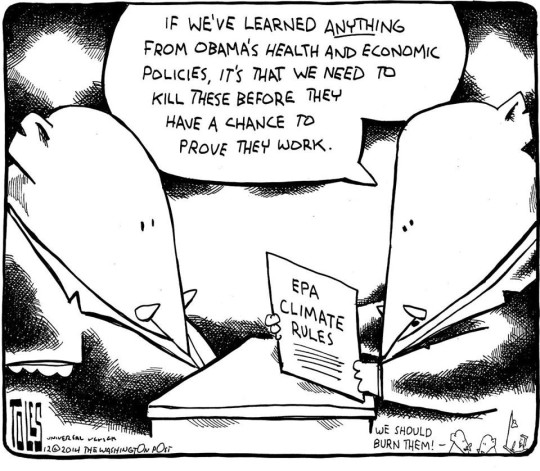by Barry Vesser | August 28, 2015
The EPA’s recently-released Clean Power Plan has been taking
a lot of flak from the Right. Although this is unsurprising, Senate Majority
Leader Mitch McConnell’s vehement opposition contradicts the values of most
Americans and is not rooted in traditional conservative values or Republican
political strengths. In the past, the Republican Party stood for national
security and economic growth. But their views on climate put those values at
risk.
The Department of Defense, last year, came out with its
Climate Change Adaptation Roadmap to address the threat that climate change
poses to national security. And it’s hard to deny that the economy of the
future will be driven by green technology. But most Republicans in Congress seem
to have been hijacked by science deniers and the fossil fuel lobby.
The EPA’s Clean Power Plan will require
the electricity sector’s greenhouse gas emissions to drop 32 percent from 2005
levels by 2030. The Plan expects renewable energy to rise to 28 percent of the
grid’s capacity by 2030 and coal to drop to 27 percent. States have until 2022 to meet interim
targets set up under the Plan.
This first national plan for reducing
greenhouse gas emissions is a step in the right direction, but is nowhere
near aggressive enough. It does not meet the scientific imperative as
described by the world’s foremost authority, the Intergovernmental Panel on Climate
Change.
Mitch McConnell, however, asserts that this
measured plan is potentially illegal. About the proposed regulations, he says, “They’re
projected to cost billions. They threaten to ship good middle-class jobs
overseas. They’ll likely make it harder to maintain reliable sources of energy
to meet demand. They’ll also likely result in higher energy bills for those who
can least afford them, potentially raising electricity rates by double digits
for the people I represent.” McConnell has even encouraged states to resist
implementing the regulations.
Of course, McConnell’s assertions fly in the face of the
reality that we are experiencing first hand in Sonoma County. Community Choice
Energy, as evidenced by Sonoma Clean Power, reduces people’s rates, keeps more
money in local economies, and significantly reduces greenhouse gases.

McConnell’s stance could be written off as parochial
politics. He represents Kentucky, the third largest coal-producing state. Coal
fuels 92% of Kentucky’s net electricity generation. In 2013-14 McConnell
received $271,250 from the coal lobby.
But McConnell’s views match those of other Republicans in
Congress. In general, Republicans
receive orders of magnitude more campaign contributions from the coal industry
compared with their Democrat colleagues, particularly over the last five years.
Coal is on the decline and is not likely to come back,
regardless of what happens with the Clean Power Plan. In a recent op-ed
Michael Bloomberg explained, “…King Coal is dying of natural causes:
Market forces, technological advances, and public demands for clean air and
climate action have combined to make alternative sources of energy more
financially attractive. The price of new wind power, for example, is lower than
that of coal in most parts of the country.”
Republicans’ allegiance to fossil fuels may hurt them in the
next election cycle. They appear to be vulnerable on two issues that are
usually strengths for their party, the economy and national security.
Renewable energy is coming, ready or not. In many places in
the country it is at cost parity with fossil fuel energy. In some places it is
cheaper, and the cost of renewables is likely to keep declining over the coming
years as the industry continues to scale up.
California provides the best example where investment in
renewables drives economic growth. California has the most aggressive policies
in the U.S. on carbon reduction and is on track to provide 33% of the state’s
power from renewable sources by 2020. Contrary
to McConnell’s claim that this will be a drag on economic growth, the clean
energy sector of renewables and energy efficiency is growing jobs at 5%
a year in California, twice as fast as state average job growth, and three
times the national job growth rate.
The solar industry alone now employees two times the number
of people that the coal industry does nationally, with plenty of room to
grow. In terms of new generation
capacity, solar has significantly outpaced coal the last two years. This shift needs
to be encouraged for the U.S. to keep up with overseas competitors. China,
India, Germany, Japan, the United Kingdom, Spain, Brazil, South Africa, and
many other countries are making massive investments in renewable energy.
So McConnell’s strategy of protecting a dirty and dying
industry and not embracing the sector that has the most potential for economic
growth in the next decade will likely not serve his party well.
The national security establishment has been warning about
the need to address climate change for years. In 2007 the Department of Defense
issued a report entitled “National Security and
the Threat of Climate Change” that concluded that climate change will pose a
serious threat to America’s national security, especially by creating
instability in already volatile regions.
In July of this year the Defense
Department issued another report
to Congress on the threat from climate change. It stated, "The
Department of Defense sees
climate change as a present
security threat, not strictly a long-term risk. We are already observing the
impacts of climate change in shocks and stressors to vulnerable nations and
communities, including in the United States, and in the Arctic, Middle East, Africa,
Asia, and South America.”
A
poll conducted by The New York Times, Stanford University and the
nonpartisan research group Resources for the Future found that an
overwhelming majority of the American public, including half of Republicans,
support government action to curb climate change.
In a more recent
poll of key political swing states, 60% of people believe that we should
increase our efforts to combat climate change.
If Republicans continue to ignore the national security
warnings on climate change from non-partisan, career military people, they seem
politically vulnerable. All Democrat
presidential front-runners have a climate action policy. Contrast this with
the last Presidential election cycle when climate was not mentioned in the
debates. It appears that this time will be different.
Note to Reader: I normally avoid writing anything that could be
construed as partisan, but the recent political rhetoric around the Clean Power
Plan, when we have a robust and growing clean global energy industry, seems
disconnected from reality and requires a response.My father is a retired high-ranking military officer, my godfather was the
Director of the National Security Administration – so I grew up in a culture
that prized rational debate and a hard-nosed assessment of realities. When I attended my parents 50th
wedding anniversary several years ago, held in the officers’ club and full of
retired and active duty military, I was surprised that when my father
introduced me to the assemblage as working on climate protection, I got an
ovation. I shouldn’t have been surprised. These are people who put duty to
country above politics, they know the science, they knew their internal
assessment on this issue and were glad someone was taking the threat
seriously. It is high time we move
beyond self-serving opinions and let prudent action based on rational analysis
guide the national debate about how to respond to climate change. It will be a
heavy lift, the likes of which we have never seen before. So as Dad would say:
“let’s get on with it!”
–
Barry Vesser is Deputy Director for The Climate Center and coordinates the Center’s Business for Clean Energy Program.

